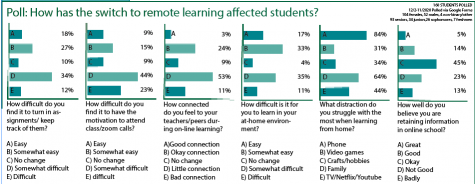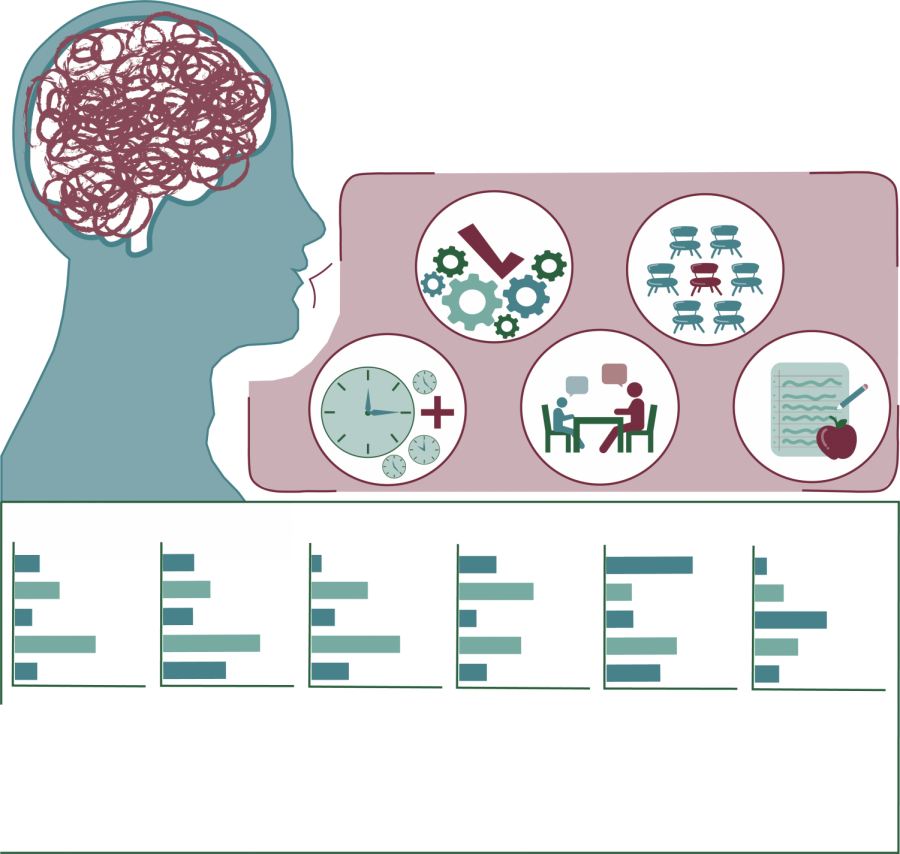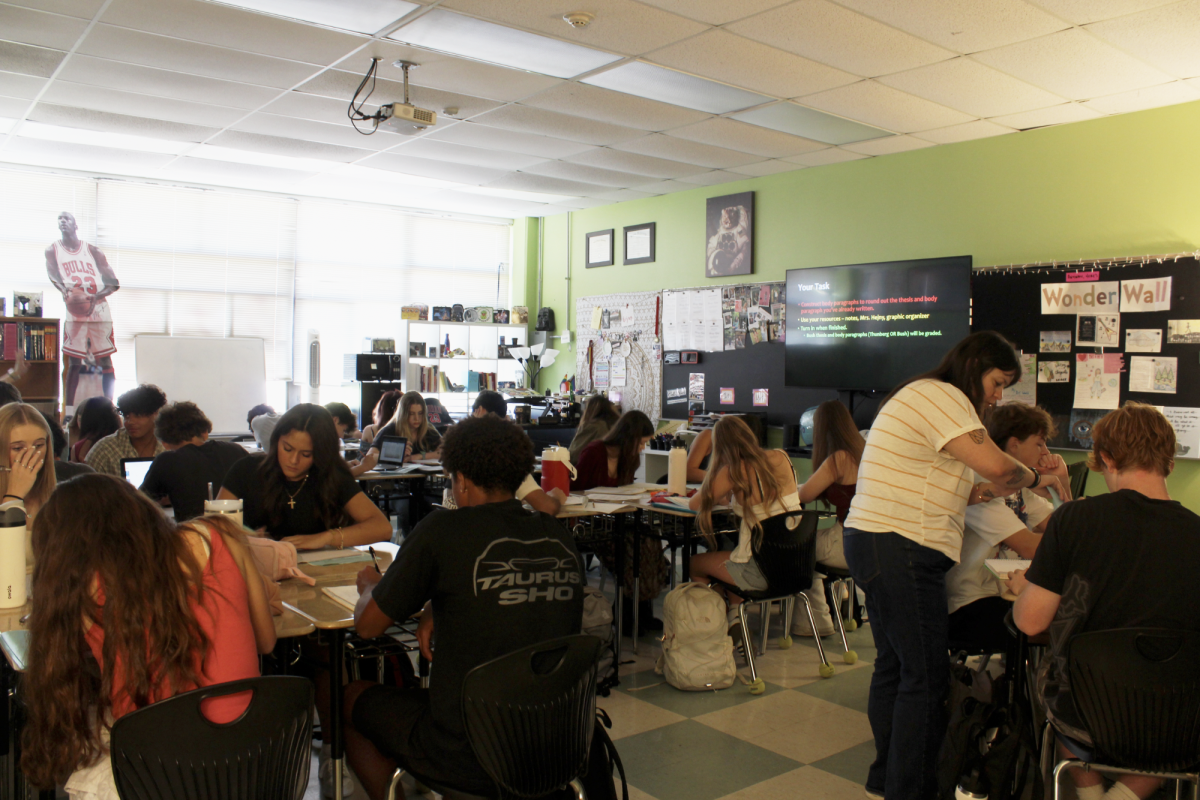504 plans during off-campus learning
January 20, 2021
In the midst of a global pandemic, schools across the country have changed to remote learning structures and adjusted their educational systems to fit within the Center for Disease control’s (CDC) COVID-19 guidelines. With the change to online school students are learning to adjust to their new environment and routine, and for some students, such as those with learning disabilities there is a new set of challenges that they have to work through.
504 PLANS
According to the Dean of Students, Susan Leos, the switch to remote learning has posed a unique set of challenges to both students and staff they learn to cope with the changes that come with it.
“Teachers and 504 students are having to find new ways to communicate with each other and new ways of providing support,” Leos said. “I think that is true for all students, not just 504 students.”
504 plans are accommodations that students with diagnosed learning disabilities can receive under the American Rehabilitation Act. The purpose of a 504 plan is to help students with learning disabilities gain the help that they need to be successful.
“In schools the 504 plan is sort of like a blueprint for success that specifies what actions or tools will help a student achieve success,” Leos said. “The purpose of a 504 plan is to level the playing field, so to speak, so that a student with a disability has what he/she needs in order to achieve academic success.”
Junior Nathan Zimmerman believes that there is a stigma surrounding receiving and using a 504 plan, but the benefits of receiving it outweigh the negative opinions of others.
“It is well worth it [to receive a 504 plan],” Zimmerman said. “It really, really helps because it takes just a little bit of weight off your back. Honestly it’s for your benefit, not for anyone else. At the end of the day, we all go home and we all rest and we all do the same assignments, it’s a way for [students with learning disabilities] to get help for [themselves].”
REMOTE LEARNING
There are positive aspects and negative aspects that have come with the switch to the remote learning structure. Changing from in-person to online school has had mixed results for students with learning disabilities, as displayed by Lilu Newsom, a student with anxiety and ADD.
“My anxiety is doing great [with remote learning],” Newsom said. “I’m less stressed, I don’t get headaches as much, and it’s wonderful. The ADD side of me is completely relaxed because I’m at home, that’s my calm place. So I have very little motivation to work on things.”
The change from in-person to online school has not only posed difficulties for students with learning disabilities, but teachers as well. Teacher Peyton Bobo who has ADHD feels that the hybrid online and in school structure can be overwhelming at times.
“It’s really hard for me to adjust back and forth [between online and in-person school],” Bobo said. “I felt like I was in a good groove when we were only online, and then it took me a minute to adjust to the [hybrid structure], and then now that we’re back online, I have another adjustment period. Structure and rhythm help make sure my brain works in an efficient way. Otherwise, I just feel like I’m doing too many things at once.”
Adjusting to doing school from home after years of having a similar routine has proposed problems for junior Kieran Duke and many other students. In a poll conducted by the Dispatch, 46% of students said they found it some degree of difficult to learn in their at-home environment.
“Adjusting to online school has been pretty difficult for me,” Duke said. “I miss actually moving to get to classes, I always struggle with sitting in one spot, and doing it for eight hours a day without many breaks has worn on me, personally.”
But regardless of how much of a struggle it has been for some students to switch to online school, according to Zimmerman the ability to get accommodations based on learning disabilities has helped students like him a lot.
“Dysgraphia isn’t a thing that just exists within school,” Zimmerman said. “It is [in] literally every other aspect [of my life]. So, having the ability to have the thing that eats up most of my day be a little bit easier is very, very nice.”
TEACHERS AND
ACCOMMODATIONS
Through the continuing experience of remote learning, junior Linday Nixon has had good experiences with teachers in regards to her 504 accommodations.
“A lot of my teachers this year really understand what it’s like to be someone with ADD trying to navigate online school,” Nixon said.
However, Newsom expressed that there is still room for improvement when it comes to enforcing 504 plans. While she believes that teachers are respecting accommodations when approached by students, she feels that it can be difficult with her anxiety to be held soley responsible for asking for her accommodations rather than teachers taking note of them and being knowledgeable of them.
“Extra time [is an accommodation] that isn’t very well enforced,” Newsom said. “I need it for my ADD, but I’m so anxious that I’m unable to go and say, ‘Hey, I have extra time accommodations with my 504, can I turn this in next period?’”
With remote learning, a challenge voiced by students has been keeping track of class assignments, 34% of students voiced that they find it somewhat difficult, and 12% responded saying that they find it difficult.
“It is kind of hard for me to keep track of assignments just because each teacher uses Blend differently so it’s not all in one place,” Nixon said. “My mom actually hired me a private tutor that’s helping me to keep all of my school work organized, and figure out what needs to be done and when.”
With the switch from in-person to online learning, Newsom believes that her accommodations should be adjusted to fit the new system that they are adapting to.
“Personally, I’d prefer to read a transcript of the lecture if that’s something that they have,” Newsom said. “Because I’ve noticed that they don’t have [a transcript] on the ‘Play-Pause-Its’, and that made me sad because having it would have made my life much easier. I absorb things better by reading them. Also providing alternate assignments instead of a lecture would help me a lot with focusing and retaining information.”
But even with the struggles that online school has, Duke believes that there are positive aspects that students can look towards.
“I do appreciate the creative ways that teachers have come up with to engage us in our classes and make it interesting for students,” Duke said.

THE FUTURE
Although not everyone with learning disabilities are keeping their accommodations in mind when searching for the right college or job for them, others have made it a factor in planning their future.
“How they treat 504s will be a huge part of deciding whether or not I’d go [to a specific university],” Newsom said. “If I could find [a college] that’s mainly non-neurotypical people, I’d go for that experience.”
The learning environment of a college is an important deciding aspect for Newsom.
“The experience that I would like to have is knowing what it feels like to be in a community of other people with similar disabilities to myself, and learning in that environment versus in an environment where people are assumed to be neurotypical until told otherwise,” Newsom said.









